In this e-weekly:
- Traveling soon? Check out www.MassTimes.org for the nearest Catholic Church to where you will be (Catholic Website -by the laptop computer)
- Pope Francis Canonizes New Female Saint known as "an apostle of the Holy Spirit" (Diocesan News and BEYOND)
- Surviving a Stroke or Helping Others to Do So (Helpful Hints for Life)
- Traveling soon? Check out www.MassTimes.org for the nearest Catholic Church to where you will be (Catholic Website -by the laptop computer)
- Pope Francis Canonizes New Female Saint known as "an apostle of the Holy Spirit" (Diocesan News and BEYOND)
- Surviving a Stroke or Helping Others to Do So (Helpful Hints for Life)
Catholic Good News
Receiving the Gospel, Serving God and Neighbor
Praying Together, Staying Together
“For where two or three are gathered together in my name,
there am I in the midst of them." Matthew 18:20
Receiving the Gospel, Serving God and Neighbor
Praying Together, Staying Together
“For where two or three are gathered together in my name,
there am I in the midst of them." Matthew 18:20
Dear friends in Christ Jesus,
Most of us pray. We talk to God throughout the day. We pray when we get up of a morning or before we go to bed. Many of us go to Mass. God and I may even take those “10 minutes a day in the classroom of silence.” But do we pray with one another? Are we able to pray with someone else?
“Those that pray together, stay together.” “The family that prays together stays together.” After we pray by ourselves, the very next thing you and I must do is pray with others. Why? So that we know Jesus is there and that His power may reach us there in our relationships and unions with others. Couples must pray together. Families must pray together. Brothers and sisters must pray together. Friends must pray together. Why? So that they stay together!
Prayer is humbling because it makes us realize that we must depend upon someone greater than ourselves or our problems. Prayer brings us the power of God and helps us to receive it. Just think when two or more do this together. They humble themselves before God and one another. Then God comes to strengthen, heal, and move those that pray together to stay together, which is what they truly desire. [Couples, are you praying with each other? Dads, do you call the family together for prayer?]
Peace and prayers in Jesus through Mary, loved by Saint Joseph,
Father Robert
P.S. The homily below goes into more detail on the above.
P.S.S. This coming Sunday is the Fourth Sunday of Easter. The readings can be found at: https://bible.usccb.org/bible/readings/042124.cfm
P.S.S.S. At the end of the e-mail is the Sunday Readings also with reflections and questions.
Most of us pray. We talk to God throughout the day. We pray when we get up of a morning or before we go to bed. Many of us go to Mass. God and I may even take those “10 minutes a day in the classroom of silence.” But do we pray with one another? Are we able to pray with someone else?
“Those that pray together, stay together.” “The family that prays together stays together.” After we pray by ourselves, the very next thing you and I must do is pray with others. Why? So that we know Jesus is there and that His power may reach us there in our relationships and unions with others. Couples must pray together. Families must pray together. Brothers and sisters must pray together. Friends must pray together. Why? So that they stay together!
Prayer is humbling because it makes us realize that we must depend upon someone greater than ourselves or our problems. Prayer brings us the power of God and helps us to receive it. Just think when two or more do this together. They humble themselves before God and one another. Then God comes to strengthen, heal, and move those that pray together to stay together, which is what they truly desire. [Couples, are you praying with each other? Dads, do you call the family together for prayer?]
Peace and prayers in Jesus through Mary, loved by Saint Joseph,
Father Robert
P.S. The homily below goes into more detail on the above.
P.S.S. This coming Sunday is the Fourth Sunday of Easter. The readings can be found at: https://bible.usccb.org/bible/readings/042124.cfm
P.S.S.S. At the end of the e-mail is the Sunday Readings also with reflections and questions.
prayer (from Latin precârius “obtained by entreaty”)
-the raising of one’s mind and heart to God
[This voluntary response may be an acknowledgment of God's greatness and of a person's total dependence on him (adoration), or gratitude for his benefits to oneself and others (thanksgiving), or sorrow for sins committed and begging for mercy (expiation), or asking for graces needed (petition), or affection for God, who is all good (love).]
-the raising of one’s mind and heart to God
[This voluntary response may be an acknowledgment of God's greatness and of a person's total dependence on him (adoration), or gratitude for his benefits to oneself and others (thanksgiving), or sorrow for sins committed and begging for mercy (expiation), or asking for graces needed (petition), or affection for God, who is all good (love).]
“Helpful Hints of Life”
Surviving a Stroke or helping another to do so
Most experts agree that if you can get treatment for a stroke in the first 3 hours, there is a very good chance of reversing it. Key signs (S T R)to notice are:
S * Ask the individual to SMILE.
T * Ask the person to TALK to SPEAK A SIMPLE SENTENCE
(Coherently) (i.e. It is sunny out today.)
R * Ask him or her to RAISE BOTH ARMS.
NOTE: Another 'sign' of a stroke is this: Ask the person to 'stick' out their tongue. If the tongue is 'crooked', if it goes to one side or the other then that is also an indication of a stroke. If he or she has trouble with ANY ONE of these tasks, call 911 immediately and describe the symptoms to the dispatcher.
Surviving a Stroke or helping another to do so
Most experts agree that if you can get treatment for a stroke in the first 3 hours, there is a very good chance of reversing it. Key signs (S T R)to notice are:
S * Ask the individual to SMILE.
T * Ask the person to TALK to SPEAK A SIMPLE SENTENCE
(Coherently) (i.e. It is sunny out today.)
R * Ask him or her to RAISE BOTH ARMS.
NOTE: Another 'sign' of a stroke is this: Ask the person to 'stick' out their tongue. If the tongue is 'crooked', if it goes to one side or the other then that is also an indication of a stroke. If he or she has trouble with ANY ONE of these tasks, call 911 immediately and describe the symptoms to the dispatcher.
All gather together. Christians come together in one place for the Eucharistic assembly. At its head is Christ himself, the principal agent of the Eucharist. He is high priest of the New Covenant; it is he himself who presides invisibly over every Eucharistic celebration. It is in representing him that the bishop or priest acting in the person of Christ the head (in persona Christi capitis) presides over the assembly, speaks after the readings, receives the offerings, and says the Eucharistic Prayer. All have their own active parts to play in the celebration, each in his own way: readers, those who bring up the offerings, those who give communion, and the whole people whose "Amen" manifests their participation.
-Catechism of the Catholic Church #1348
-Catechism of the Catholic Church #1348
New Advent
www.newadvent.org
Website contains news, commentary, a Catholic Encyclopedia of terms, the writings of St. Thomas Aquinas (one the Church's greatest theologians), writings of the Fathers of the Church, the Holy Bible and much more.
[For those traveling this summer and needing to get to the Holy Mass.]
MASS TIMES AND CATHOLIC CHURCHES throughout the US
http://www.masstimes.org/
www.newadvent.org
Website contains news, commentary, a Catholic Encyclopedia of terms, the writings of St. Thomas Aquinas (one the Church's greatest theologians), writings of the Fathers of the Church, the Holy Bible and much more.
[For those traveling this summer and needing to get to the Holy Mass.]
MASS TIMES AND CATHOLIC CHURCHES throughout the US
http://www.masstimes.org/
http://www.fpressf.com/wp-content/uploads/2011/07/Church-Family-News.jpg
Blessed Elena Guerra
Blessed Elena Guerra. | Credit: Oblates of the Holy Spirit
Blessed Elena Guerra. | Credit: Oblates of the Holy Spirit
Pope Francis has approved a miracle attributed to the intercession of Blessed Elena Guerra, paving the way for the canonization of a new female saint known as “an apostle of the Holy Spirit.”
A friend of Pope Leo XIII and the teacher of St. Gemma Galgani, Elena Guerra (1835–1914) is known for her spiritual writings and her passionate devotion to the Holy Spirit.
Guerra wrote more than a dozen letters to Pope Leo XIII between 1895 and 1903 in which she urged him to exhort all Catholics to call upon the Holy Spirit in prayer.
The pope heeded Guerra’s request and published three documents on the Holy Spirit during their correspondence, including a letter asking the entire Church to pray a novena to the Holy Spirit leading up to Pentecost in 1895 and his encyclical on the Holy Spirit, Divinum Illud Munus, in 1897.
“Pentecost is not over,” Guerra wrote. “In fact, it is continually going on in every time and in every place, because the Holy Spirit desired to give himself to all men and all who want him can always receive him, so we do not have to envy the apostles and the first believers; we only have to dispose ourselves like them to receive him well, and he will come to us as he did to them.”
Guerra is the foundress of the Oblates of the Holy Spirit, a religious congregation recognized by the Church in 1882.
Pope John XXIII called Guerra “a modern-day apostle of the Holy Spirit” as he beatified her in 1959.
The life of Elena GuerraBorn into a noble family in Lucca, Italy in 1835, Guerra was well-educated and formed in her faith.
For much of her 20s, Guerra was bedridden with a serious illness, a challenge that turned out to be transformational for her as she dedicated herself to meditating on Scripture and the writings of the Church Fathers.
Guerra felt the call to consecrate herself to God during a pilgrimage to Rome with her father after her recovery. She attended the third public session of Vatican I in St. Peter’s Basilica in April 1870 and later met Pope Pius IX on June 23, 1870.
“At the sight of Pope Pius IX she was so moved that, upon returning to Lucca, she vowed to offer her life for the pope,” according to the Vatican Dicastery for the Causes of Saints.
Against the wishes of her family, in her mid-30s Guerra formed a religious community dedicated to education, which eventually became the Oblates of the Holy Spirit.
One of her students, St. Gemma Galgani, wrote in her autobiography about the strong spiritual impact of her education by the Oblate sisters. Guerra personally taught Galgani French and Church history and exempted Galgani from the monthly school fee when her father fell into bankruptcy.
During her correspondence with Pope Leo XIII, Guerra also composed prayers to the Holy Spirit, including a Holy Spirit Chaplet, asking the Lord to “send forth your spirit and renew the world.”
The religious founder faced difficulties in the last years of her life when some of her sisters accused her of bad administration, leading her to resign from her duties as superior.
Guerra died on Holy Saturday on April 11, 1914. Her tomb is located in Lucca in the Church of Sant’Agostino. The Oblate sisters whom Guerra founded continue her mission today in Italy, Cameroon, Canada, Philippines, and Rwanda.
The miraclePope Francis recognized a miracle attributed to Guerra’s intercession that involved the healing of a man named Paulo in Uberlândia, Brazil, in 2010 after he fell from a tree and ended up in a coma with a serious brain injury. After undergoing a craniotomy and decompression surgery, the man’s situation worsened, and 10 days after his fall the protocol was opened to declare brain death, according to the Vatican.
While he was in a coma, members of the Charismatic Renewal organized prayer for Paulo’s recovery, asking everyone to pray for his healing through the intercession of Blessed Elena Guerra. On the 10th day after they began praying to Blessed Elena, doctors found an unexpected improvement in his condition, and within less than a month he was discharged from the hospital in good condition.
The pope officially approved the miracle during an audience with Cardinal Marcello Semeraro, the prefect of the Vatican Dicastery for the Causes of Saints, on April 13.
During the audience, the pope also approved the martyrdom of Servants of God Cayetano Clausellas Ballvé, a diocesan priest, and Antonio Tort Reixachs, a layman and father, both killed during the Spanish Civil War in 1936.
The pope also recognized the heroic virtues of Sister Teresa Lanfranco, an Italian religious from the Congregation of the Daughters of Santa Maria di Leuca, who died in Rome in 1989.
The Vatican will announce the canonization date of Blessed Elena Guerra at a later time.
Courtney Mares is a Rome Correspondent for Catholic News Agency. A graduate of Harvard University, she has reported from news bureaus on three continents and was awarded the Gardner Fellowship for her work with North Korean refugees.
A friend of Pope Leo XIII and the teacher of St. Gemma Galgani, Elena Guerra (1835–1914) is known for her spiritual writings and her passionate devotion to the Holy Spirit.
Guerra wrote more than a dozen letters to Pope Leo XIII between 1895 and 1903 in which she urged him to exhort all Catholics to call upon the Holy Spirit in prayer.
The pope heeded Guerra’s request and published three documents on the Holy Spirit during their correspondence, including a letter asking the entire Church to pray a novena to the Holy Spirit leading up to Pentecost in 1895 and his encyclical on the Holy Spirit, Divinum Illud Munus, in 1897.
“Pentecost is not over,” Guerra wrote. “In fact, it is continually going on in every time and in every place, because the Holy Spirit desired to give himself to all men and all who want him can always receive him, so we do not have to envy the apostles and the first believers; we only have to dispose ourselves like them to receive him well, and he will come to us as he did to them.”
Guerra is the foundress of the Oblates of the Holy Spirit, a religious congregation recognized by the Church in 1882.
Pope John XXIII called Guerra “a modern-day apostle of the Holy Spirit” as he beatified her in 1959.
The life of Elena GuerraBorn into a noble family in Lucca, Italy in 1835, Guerra was well-educated and formed in her faith.
For much of her 20s, Guerra was bedridden with a serious illness, a challenge that turned out to be transformational for her as she dedicated herself to meditating on Scripture and the writings of the Church Fathers.
Guerra felt the call to consecrate herself to God during a pilgrimage to Rome with her father after her recovery. She attended the third public session of Vatican I in St. Peter’s Basilica in April 1870 and later met Pope Pius IX on June 23, 1870.
“At the sight of Pope Pius IX she was so moved that, upon returning to Lucca, she vowed to offer her life for the pope,” according to the Vatican Dicastery for the Causes of Saints.
Against the wishes of her family, in her mid-30s Guerra formed a religious community dedicated to education, which eventually became the Oblates of the Holy Spirit.
One of her students, St. Gemma Galgani, wrote in her autobiography about the strong spiritual impact of her education by the Oblate sisters. Guerra personally taught Galgani French and Church history and exempted Galgani from the monthly school fee when her father fell into bankruptcy.
During her correspondence with Pope Leo XIII, Guerra also composed prayers to the Holy Spirit, including a Holy Spirit Chaplet, asking the Lord to “send forth your spirit and renew the world.”
The religious founder faced difficulties in the last years of her life when some of her sisters accused her of bad administration, leading her to resign from her duties as superior.
Guerra died on Holy Saturday on April 11, 1914. Her tomb is located in Lucca in the Church of Sant’Agostino. The Oblate sisters whom Guerra founded continue her mission today in Italy, Cameroon, Canada, Philippines, and Rwanda.
The miraclePope Francis recognized a miracle attributed to Guerra’s intercession that involved the healing of a man named Paulo in Uberlândia, Brazil, in 2010 after he fell from a tree and ended up in a coma with a serious brain injury. After undergoing a craniotomy and decompression surgery, the man’s situation worsened, and 10 days after his fall the protocol was opened to declare brain death, according to the Vatican.
While he was in a coma, members of the Charismatic Renewal organized prayer for Paulo’s recovery, asking everyone to pray for his healing through the intercession of Blessed Elena Guerra. On the 10th day after they began praying to Blessed Elena, doctors found an unexpected improvement in his condition, and within less than a month he was discharged from the hospital in good condition.
The pope officially approved the miracle during an audience with Cardinal Marcello Semeraro, the prefect of the Vatican Dicastery for the Causes of Saints, on April 13.
During the audience, the pope also approved the martyrdom of Servants of God Cayetano Clausellas Ballvé, a diocesan priest, and Antonio Tort Reixachs, a layman and father, both killed during the Spanish Civil War in 1936.
The pope also recognized the heroic virtues of Sister Teresa Lanfranco, an Italian religious from the Congregation of the Daughters of Santa Maria di Leuca, who died in Rome in 1989.
The Vatican will announce the canonization date of Blessed Elena Guerra at a later time.
Courtney Mares is a Rome Correspondent for Catholic News Agency. A graduate of Harvard University, she has reported from news bureaus on three continents and was awarded the Gardner Fellowship for her work with North Korean refugees.
The shrine of Our Lady of Lourdes in Lourdes, France (photo: webandarts / Pixabay/CC0)
Joan Frawley Desmond BlogsMay 10, 2021When Franciscan Oblate Sister of the Sacred Heart Bernadette Moriau made the roundtrip journey for her 2008 Lourdes pilgrimage, she was transported from her French convent in an “ambulance” train car designated for the sick visiting the Marian shrine where the Blessed Virgin appeared in 1858.
Nights on the train were spent in agony, getting little rest as she lay on a narrow upper bunk. For 42 years, a painful degenerative disease of the spine had slowly taken control of Sister Bernadette’s body. And by 2008, the woman who had dreamed of bringing God’s love to the needy and trained as a nurse had been reduced to a state of powerlessness by an illness that left her dependent on others.
Mincing no words in her newly-released memoir, My Life is a Miracle, which traces the astonishing events that brought her case to the world’s attention as the 70th miracle effected at Lourdes, she describes her left foot as almost completely twisted in a “backward position.” And her “back, spine, and pelvis were like jelly,” supported by a “rigid cervical-lumbar corset.” Day and night her body ached, even as electric shocks rippled through her legs.
A steady supply of morphine made “the burning of these invisible thorns” just bearable, but impaired her cognitive functioning. And a “spinal neurostimulator had been implanted under the skis to ease the excruciating pain.”
More than once, the harrowing daily struggle had brought her to the brink of despair, but she had long since made her peace with her condition. At Lourdes, she did not pray for her own recovery, but her spirits were fortified as she took part in the daily processions and bathed in the waters of the grotto. There where Mary and her Son preside, and space and time stand still, the values of the world are held at bay and the radiant dignity of each person created in God’s image is made manifest.
So as Sister Bernadette made the agonizing return trip, she channeled what energy she possessed into petitions for the healing of her fellow pilgrims. And as the creaking ambulance train was sidelined to allow high-speed trains to move more quickly to their destination, she was briefly reminded that she had left the grotto behind. “They shoot past without giving us a look,” she thought of the speeding trains rushing by the ambulance cars. “That’s life.”
But life, as she knew it, would soon change radically. Within days of her return from Lourdes, Sister Bernadette experienced a sudden cessation of pain and a complete healing of her body, or — as she calls it — a “re-creation.” Her twisted foot had been straightened, and her back was strong. She cast off her corset and walked freely.
The degenerative disease that had defined her life for four decades had itself been rendered powerless through a miracle.
Weeping tears of joy, she rushed to share the news with the other sisters, who joined her in prayers of gratitude for God’s gratuitous love and mercy.
The flood of joy, she explains, “had nothing to do with a feeling of victory. For, though I had battled this disease, the healing had been granted by pure grace.”
On Feb. 11, 2018, the date marking the 160th anniversary of the apparition, Sister Bernadette’s healing was declared the 70th official miracle effected at Lourdes.
The extraordinary healing, the years of pain and struggle that preceded it, and the decade-long medical and ecclesiastical investigations that followed are the subject of her story, told by a woman of faith who has long pondered the problem of suffering as well as the mystery of her recovery.
“To embrace total thanksgiving is not to be dismissive of those who have not received the same grace, or forgetful of the suffering and misery of others,” she writes.
“I survived a forty-two-year struggle. But that was a sign from God, a visible sign of his love for all of us.”
Her story thus serves as an invitation for her audience to draw close to the beating heart of the Savior who makes all things new. Likewise, she offers a window into a lonely and hidden place: the daily battles of those burdened by chronic illness and disabilities and who subsist on hope alone.
She has not forgotten what it is like to be consumed with agony, to visit a pain clinic for relief only to receive confirmation that one’s condition has worsened. And though she is a spirited woman, she conveys the sting of feeling invisible in culture that moves too quickly and is too impatient to accompany the weak and the infirm.
The book also traces the Lourdes Office of Medical Assessments’ confidential and thorough investigation of Sister Bernadette’s case, with her own doctor and other medical specialists testifying to the inexplicable and permanent nature of her recovery.
As she acknowledges with characteristically blunt humor, the medical community was asked to engage in an “odd kind of diagnosis” — not to effect a cure, but to “prove why they had nothing to do” with her healing.
The extensive inquiry was shrouded in secrecy until the miracle was formally confirmed by Church authorities, after a period of discernment, and publicly announced in 2018.
Since then, Sister Bernadette has become something of a celebrity, even for France’s mostly secularized media. She has offered her testimony for reporters and youth groups. And though the public has latched onto the extraordinary nature of the miracle itself, and the scientific process of verification, Sister Bernadette has sought to fulfill what she understands to be the Lord’s purpose in bringing her into the spotlight.
The story “within my story,” she writes, is that “faith, hope, and charity are the core that had always been burning in my former life, that fuels my present life, and will, I hope, assure my future life and my eternal life in heaven.”
The language of faith shocks most of her French countrymen, and the author reminds her audience that she had already warned them of her supposedly outdated Christian beliefs and values.
But to those who suffer, to those struggling to keep the flame of hope alive, to those consumed with self-hatred or doubts about the meaning of life itself, she is the Lord’s emissary.
The healing that changed her life, she says, is a “sign of the mad love of the Creator for his creation.”
This God is not “vengeful or manipulative.” The loving Father who re-created her seeks to wash each of us in his ocean of mercy. He is “restorative … loving, begging, assisting, humble in his grandeur, powerful in his love, and above all faithful.”
‘Godmothers for Life’ serve vulnerable moms in Uruguay
Montevideo, Uruguay, Mar 18 (EWTN News/CNA)
An Uruguayan non-profit organization called “Godmothers for Life” has been serving mothers in crisis pregnancies for more than 17 years, working out of a facility at Saint Jerome Chapel in Montevideo.
Offering talks, one-on-one conversations, and job training, these “godmothers” help vulnerable moms face their pregnancies with dignity and hope, and not to see abortion as the only way out of their situation.
Being chosen as a godparent is a significant honor in Latin America, where godparents are typically highly involved in the lives of their godchildren, which gives the group’s name a special meaning.
The organization has its origins in 2000 at Basilica of Our Lady of Guadalupe in Mexico. Marta Grego and her husband traveled from Uruguay to visit the shrine where they experienced in prayer what they described as “Our Lady of Guadalupe's call” to dedicate themselves to the cause of life.
Marta felt in her heart that God was asking her to fight abortion and save babies when she got back to Uruguay. However, she did not see a clear path forward at the time, because she was working and supporting her family. Nevertheless, she felt God telling her, “You take care of my things and I'll take care of yours.”
When the couple returned to Uruguay, a pregnant woman rang their doorbell asking for food. She had made up her mind to get an abortion. That encounter was how Godmothers for Life got its start, with Marta Grego as its founder and director.
Although the original purpose of the organization was to help women decide to keep their babies, Teresa Rodriguez, the group’s current president, explained that they eventually saw “that besides the girls who wanted to abort, there were pregnant girls who were not thinking of aborting but were in a very vulnerable situation.”
In response, the group expanded its work by providing free job training courses and workshops on Christian and human formation, “always focusing on the mom and her baby, helping her to value motherhood, but also helping the family,” so they can find their way out of poverty. Currently, Godmothers for Life is serving about 60 at-risk women in Montevideo, relying solely on donations for their work.
“A bond is created between us and the mothers which is not based on dependency but on affection. We are one big family,” Rodriguez said.
In addition to their main location in Montevideo, Godmothers for Life has a place at Saint Eugene Chapel in the administrative district, where they care for an additional 60 women. They hope to extend the project to other areas of Uruguay. They have already begun plans in several other districts.
Joan Frawley Desmond BlogsMay 10, 2021When Franciscan Oblate Sister of the Sacred Heart Bernadette Moriau made the roundtrip journey for her 2008 Lourdes pilgrimage, she was transported from her French convent in an “ambulance” train car designated for the sick visiting the Marian shrine where the Blessed Virgin appeared in 1858.
Nights on the train were spent in agony, getting little rest as she lay on a narrow upper bunk. For 42 years, a painful degenerative disease of the spine had slowly taken control of Sister Bernadette’s body. And by 2008, the woman who had dreamed of bringing God’s love to the needy and trained as a nurse had been reduced to a state of powerlessness by an illness that left her dependent on others.
Mincing no words in her newly-released memoir, My Life is a Miracle, which traces the astonishing events that brought her case to the world’s attention as the 70th miracle effected at Lourdes, she describes her left foot as almost completely twisted in a “backward position.” And her “back, spine, and pelvis were like jelly,” supported by a “rigid cervical-lumbar corset.” Day and night her body ached, even as electric shocks rippled through her legs.
A steady supply of morphine made “the burning of these invisible thorns” just bearable, but impaired her cognitive functioning. And a “spinal neurostimulator had been implanted under the skis to ease the excruciating pain.”
More than once, the harrowing daily struggle had brought her to the brink of despair, but she had long since made her peace with her condition. At Lourdes, she did not pray for her own recovery, but her spirits were fortified as she took part in the daily processions and bathed in the waters of the grotto. There where Mary and her Son preside, and space and time stand still, the values of the world are held at bay and the radiant dignity of each person created in God’s image is made manifest.
So as Sister Bernadette made the agonizing return trip, she channeled what energy she possessed into petitions for the healing of her fellow pilgrims. And as the creaking ambulance train was sidelined to allow high-speed trains to move more quickly to their destination, she was briefly reminded that she had left the grotto behind. “They shoot past without giving us a look,” she thought of the speeding trains rushing by the ambulance cars. “That’s life.”
But life, as she knew it, would soon change radically. Within days of her return from Lourdes, Sister Bernadette experienced a sudden cessation of pain and a complete healing of her body, or — as she calls it — a “re-creation.” Her twisted foot had been straightened, and her back was strong. She cast off her corset and walked freely.
The degenerative disease that had defined her life for four decades had itself been rendered powerless through a miracle.
Weeping tears of joy, she rushed to share the news with the other sisters, who joined her in prayers of gratitude for God’s gratuitous love and mercy.
The flood of joy, she explains, “had nothing to do with a feeling of victory. For, though I had battled this disease, the healing had been granted by pure grace.”
On Feb. 11, 2018, the date marking the 160th anniversary of the apparition, Sister Bernadette’s healing was declared the 70th official miracle effected at Lourdes.
The extraordinary healing, the years of pain and struggle that preceded it, and the decade-long medical and ecclesiastical investigations that followed are the subject of her story, told by a woman of faith who has long pondered the problem of suffering as well as the mystery of her recovery.
“To embrace total thanksgiving is not to be dismissive of those who have not received the same grace, or forgetful of the suffering and misery of others,” she writes.
“I survived a forty-two-year struggle. But that was a sign from God, a visible sign of his love for all of us.”
Her story thus serves as an invitation for her audience to draw close to the beating heart of the Savior who makes all things new. Likewise, she offers a window into a lonely and hidden place: the daily battles of those burdened by chronic illness and disabilities and who subsist on hope alone.
She has not forgotten what it is like to be consumed with agony, to visit a pain clinic for relief only to receive confirmation that one’s condition has worsened. And though she is a spirited woman, she conveys the sting of feeling invisible in culture that moves too quickly and is too impatient to accompany the weak and the infirm.
The book also traces the Lourdes Office of Medical Assessments’ confidential and thorough investigation of Sister Bernadette’s case, with her own doctor and other medical specialists testifying to the inexplicable and permanent nature of her recovery.
As she acknowledges with characteristically blunt humor, the medical community was asked to engage in an “odd kind of diagnosis” — not to effect a cure, but to “prove why they had nothing to do” with her healing.
The extensive inquiry was shrouded in secrecy until the miracle was formally confirmed by Church authorities, after a period of discernment, and publicly announced in 2018.
Since then, Sister Bernadette has become something of a celebrity, even for France’s mostly secularized media. She has offered her testimony for reporters and youth groups. And though the public has latched onto the extraordinary nature of the miracle itself, and the scientific process of verification, Sister Bernadette has sought to fulfill what she understands to be the Lord’s purpose in bringing her into the spotlight.
The story “within my story,” she writes, is that “faith, hope, and charity are the core that had always been burning in my former life, that fuels my present life, and will, I hope, assure my future life and my eternal life in heaven.”
The language of faith shocks most of her French countrymen, and the author reminds her audience that she had already warned them of her supposedly outdated Christian beliefs and values.
But to those who suffer, to those struggling to keep the flame of hope alive, to those consumed with self-hatred or doubts about the meaning of life itself, she is the Lord’s emissary.
The healing that changed her life, she says, is a “sign of the mad love of the Creator for his creation.”
This God is not “vengeful or manipulative.” The loving Father who re-created her seeks to wash each of us in his ocean of mercy. He is “restorative … loving, begging, assisting, humble in his grandeur, powerful in his love, and above all faithful.”
‘Godmothers for Life’ serve vulnerable moms in Uruguay
Montevideo, Uruguay, Mar 18 (EWTN News/CNA)
An Uruguayan non-profit organization called “Godmothers for Life” has been serving mothers in crisis pregnancies for more than 17 years, working out of a facility at Saint Jerome Chapel in Montevideo.
Offering talks, one-on-one conversations, and job training, these “godmothers” help vulnerable moms face their pregnancies with dignity and hope, and not to see abortion as the only way out of their situation.
Being chosen as a godparent is a significant honor in Latin America, where godparents are typically highly involved in the lives of their godchildren, which gives the group’s name a special meaning.
The organization has its origins in 2000 at Basilica of Our Lady of Guadalupe in Mexico. Marta Grego and her husband traveled from Uruguay to visit the shrine where they experienced in prayer what they described as “Our Lady of Guadalupe's call” to dedicate themselves to the cause of life.
Marta felt in her heart that God was asking her to fight abortion and save babies when she got back to Uruguay. However, she did not see a clear path forward at the time, because she was working and supporting her family. Nevertheless, she felt God telling her, “You take care of my things and I'll take care of yours.”
When the couple returned to Uruguay, a pregnant woman rang their doorbell asking for food. She had made up her mind to get an abortion. That encounter was how Godmothers for Life got its start, with Marta Grego as its founder and director.
Although the original purpose of the organization was to help women decide to keep their babies, Teresa Rodriguez, the group’s current president, explained that they eventually saw “that besides the girls who wanted to abort, there were pregnant girls who were not thinking of aborting but were in a very vulnerable situation.”
In response, the group expanded its work by providing free job training courses and workshops on Christian and human formation, “always focusing on the mom and her baby, helping her to value motherhood, but also helping the family,” so they can find their way out of poverty. Currently, Godmothers for Life is serving about 60 at-risk women in Montevideo, relying solely on donations for their work.
“A bond is created between us and the mothers which is not based on dependency but on affection. We are one big family,” Rodriguez said.
In addition to their main location in Montevideo, Godmothers for Life has a place at Saint Eugene Chapel in the administrative district, where they care for an additional 60 women. They hope to extend the project to other areas of Uruguay. They have already begun plans in several other districts.
Vatican City, Jun 2, 2015 / 05:02 am (EWTN News/CNA) - Pope Francis on several occasions has spoken of his strong devotion to the Little Flower saint as well as his habit of asking her for favors: favors, his former press secretary says, which have often come in the form little miracles.
One of those miracles came Aug. 7, 2010, when the then-cardinal Bergoglio was accompanied by his press secretary, Federico Wals, to celebrate Mass honoring St. Cajetan on his feast day.
The cardinal was set to celebrate a Mass at the saint’s shrine in Buenos Aires and then walk to greet a long line of pilgrims, as he did every year.
“When leaving he told me that he had already asked Santa Teresita (St. Therese of Liseux) to send him a sign,” Wals said in an interview with Bolivian newspaper “El Deber” published May 31.
“When he told me this I was very skeptical and asked myself ‘A sign?’”
The former press secretary for Cardinal Jorge Mario Bergoglio – now Pope Francis – gave an interview to El Deber in which he detailed personal stories and memories from his time working with the then-archbishop of Buenos Aires.
Located on the outskirts of Buenos Aires, the Shrine of St. Cajetan draws thousands of pilgrims each year on the feast of his death.
Mass is celebrated each hour on the Aug. 7 feast, and after attending faithful queue and wait as long as 10 hours to pass in front of a small statue of the saint and kiss the glass separating it from them.
As archbishop of Buenos Aires then-cardinal Bergoglio would preside over a Mass himself, and then walk down the line of pilgrims – which sometimes extended 15 blocks – to greet people, speak with them and bless the children.
That day in 2010 “he didn't feel very well, but we were going to go anyway,” Wals said, explaining that Bergoglio had asked St. Therese to send him a sign as to whether to go all the way or not, since after the Mass he had to walk 15 blocks down the line of faithful.
After celebrating Mass the cardinal was in too much pain to walk the whole distance, and decided to go just two blocks before heading back to the center of Buenos Aires, Wals recalled.
However, as they reached the second block Wals said they came across a man “taller than (the cardinal), dressed with a black overcoat and he had his right hand inside the coat.”
Before they could blink the man “pulled out a white rose,” he said, explaining that Bergoglio was “surprised,” blessed the rose and tried to move out of the way.
At that moment the man told the future Pope “you don't understand anything: this is the sign that you are waiting for.” He then smiled and handed Bergoglio the rose.
Once Bergoglio heard what the man said he immediately grabbed the rose, Wals said. The cardinal then told him, “Federico, Santa Teresita did not abandon me, I'm going to walk until the end of the line (of faithful).”
“At that moment the man disappeared, we never saw each other again. Bergoglio's countenance changed, he was radiant and continued until the end.”
Wals has met with Bergoglio since his election as Bishop of Rome, and said that as Pope, other similar things have happened.
One of them took place in January while the Pope was on his way to the Philippines. During his flight from Sri Lanka to Manila Pope Francis received a bas-relief, or carving, of St. Therese from French journalist Caroline Pigozzi.
After receiving the image, Francis told other journalists present that “I have the habit, when I don't know how things will go, to ask St. Therese the little child, St. Therese of Jesus, to ask her if she takes a problem in hand, some thing, that she send me a rose.”
“I asked also for this trip, that she'd take it in hand and that she would send me a rose. But instead of a rose she came herself to greet me,” he said.
Pigozzi spoke with EWTN News later, saying that she had originally found the image in a Paris flea market, and had polished it herself to give to the Pope as part of a set for Christmas and for his Dec. 17 birthday.
One of those miracles came Aug. 7, 2010, when the then-cardinal Bergoglio was accompanied by his press secretary, Federico Wals, to celebrate Mass honoring St. Cajetan on his feast day.
The cardinal was set to celebrate a Mass at the saint’s shrine in Buenos Aires and then walk to greet a long line of pilgrims, as he did every year.
“When leaving he told me that he had already asked Santa Teresita (St. Therese of Liseux) to send him a sign,” Wals said in an interview with Bolivian newspaper “El Deber” published May 31.
“When he told me this I was very skeptical and asked myself ‘A sign?’”
The former press secretary for Cardinal Jorge Mario Bergoglio – now Pope Francis – gave an interview to El Deber in which he detailed personal stories and memories from his time working with the then-archbishop of Buenos Aires.
Located on the outskirts of Buenos Aires, the Shrine of St. Cajetan draws thousands of pilgrims each year on the feast of his death.
Mass is celebrated each hour on the Aug. 7 feast, and after attending faithful queue and wait as long as 10 hours to pass in front of a small statue of the saint and kiss the glass separating it from them.
As archbishop of Buenos Aires then-cardinal Bergoglio would preside over a Mass himself, and then walk down the line of pilgrims – which sometimes extended 15 blocks – to greet people, speak with them and bless the children.
That day in 2010 “he didn't feel very well, but we were going to go anyway,” Wals said, explaining that Bergoglio had asked St. Therese to send him a sign as to whether to go all the way or not, since after the Mass he had to walk 15 blocks down the line of faithful.
After celebrating Mass the cardinal was in too much pain to walk the whole distance, and decided to go just two blocks before heading back to the center of Buenos Aires, Wals recalled.
However, as they reached the second block Wals said they came across a man “taller than (the cardinal), dressed with a black overcoat and he had his right hand inside the coat.”
Before they could blink the man “pulled out a white rose,” he said, explaining that Bergoglio was “surprised,” blessed the rose and tried to move out of the way.
At that moment the man told the future Pope “you don't understand anything: this is the sign that you are waiting for.” He then smiled and handed Bergoglio the rose.
Once Bergoglio heard what the man said he immediately grabbed the rose, Wals said. The cardinal then told him, “Federico, Santa Teresita did not abandon me, I'm going to walk until the end of the line (of faithful).”
“At that moment the man disappeared, we never saw each other again. Bergoglio's countenance changed, he was radiant and continued until the end.”
Wals has met with Bergoglio since his election as Bishop of Rome, and said that as Pope, other similar things have happened.
One of them took place in January while the Pope was on his way to the Philippines. During his flight from Sri Lanka to Manila Pope Francis received a bas-relief, or carving, of St. Therese from French journalist Caroline Pigozzi.
After receiving the image, Francis told other journalists present that “I have the habit, when I don't know how things will go, to ask St. Therese the little child, St. Therese of Jesus, to ask her if she takes a problem in hand, some thing, that she send me a rose.”
“I asked also for this trip, that she'd take it in hand and that she would send me a rose. But instead of a rose she came herself to greet me,” he said.
Pigozzi spoke with EWTN News later, saying that she had originally found the image in a Paris flea market, and had polished it herself to give to the Pope as part of a set for Christmas and for his Dec. 17 birthday.
AFTER WINNING "THE VOICE",
ITALIAN NUN SAYS RELIGIOUS LIFE IS HER FIRST LOVE
After winning a televised nationwide singing competition, an Italian nun has announced that she will “return to my priorities, which are prayer, getting ...up early and teaching at my school.”
Sister Cristina Scuccia, whose performance of pop songs on the show “The Voice” made her an international sensation, said that she was not sure what she would do about the recording contract that was part of her prize for victory. “I’ll discuss everything with my superiors,” she said.
Sister Scuccia explained her participation in the televised competition as a form of evangelization. “I have a gift and God gave me that gift and I have used it to say that God has taken nothing away from me,” she explained. Upon being named the winner of the contest, she asked the audience to join here in the Lord’s Prayer.
http://www.catholicculture.org/news/headlines/index.cfm?storyid=21653
ITALIAN NUN SAYS RELIGIOUS LIFE IS HER FIRST LOVE
After winning a televised nationwide singing competition, an Italian nun has announced that she will “return to my priorities, which are prayer, getting ...up early and teaching at my school.”
Sister Cristina Scuccia, whose performance of pop songs on the show “The Voice” made her an international sensation, said that she was not sure what she would do about the recording contract that was part of her prize for victory. “I’ll discuss everything with my superiors,” she said.
Sister Scuccia explained her participation in the televised competition as a form of evangelization. “I have a gift and God gave me that gift and I have used it to say that God has taken nothing away from me,” she explained. Upon being named the winner of the contest, she asked the audience to join here in the Lord’s Prayer.
http://www.catholicculture.org/news/headlines/index.cfm?storyid=21653
SINGING NUN TO RETURN TO PRAYER AFTER WINNING THE VOICE
A young singing nun, Sister Cristina Scuccia, has vowed to return to her life of prayer, school-teaching and preaching after winning Italy's version of the popular TV talent show The Voice.
The 25-year-old nun thanked God after prevailing in the final of the show on State broadcaster Rai, which ended early on Friday.
"My presence here is not down to me, it's thanks to the man upstairs," said the Sicilian nun, known as Suor Cristina after becoming a household name in Italy.
"My aim was to say that I have met Jesus. I have a gift and God gave me that gift and I have used it to say that God has taken nothing away from me.
"Now I want to return to my priorities, which are prayer, getting up early and teaching at my school. I will never give up on my vows and the greatest love of my life for a singing career".
Scuccia became an Internet sensation after winning over the judges at a blind audition in March with her version of Alicia Keys' No One - the clip of which has received more than 50 million hits on YouTube.
After crushing her nearest rival by claiming 62% of the popular vote in the final, she led the audience in reciting the Lord's Prayer.
Her victory gives her a recording contract with Universal.
"I'll discuss everything with my superiors," Scuccia said.
"Nothing is ruled out in evangelization and we'll take our message out on the streets if necessary. "When I make a disc of my songs, they will be about love and real situations, with language that communicates to everyone".
http://www.ansa.it/english/news/lifestyle/arts/2014/06/06/singing-nun-to-return-to-prayer_47cd2573-f0f2-4716-8b8f-7af7b0166fe7.html See More
In order to gather together scattered humanity God calls Abram from his country, his kindred and his father's house, and makes him Abraham, that is, "the father of a multitude of nations". "In you all the nations of the earth shall be blessed." -Catechism of the Catholic Church #59
A young singing nun, Sister Cristina Scuccia, has vowed to return to her life of prayer, school-teaching and preaching after winning Italy's version of the popular TV talent show The Voice.
The 25-year-old nun thanked God after prevailing in the final of the show on State broadcaster Rai, which ended early on Friday.
"My presence here is not down to me, it's thanks to the man upstairs," said the Sicilian nun, known as Suor Cristina after becoming a household name in Italy.
"My aim was to say that I have met Jesus. I have a gift and God gave me that gift and I have used it to say that God has taken nothing away from me.
"Now I want to return to my priorities, which are prayer, getting up early and teaching at my school. I will never give up on my vows and the greatest love of my life for a singing career".
Scuccia became an Internet sensation after winning over the judges at a blind audition in March with her version of Alicia Keys' No One - the clip of which has received more than 50 million hits on YouTube.
After crushing her nearest rival by claiming 62% of the popular vote in the final, she led the audience in reciting the Lord's Prayer.
Her victory gives her a recording contract with Universal.
"I'll discuss everything with my superiors," Scuccia said.
"Nothing is ruled out in evangelization and we'll take our message out on the streets if necessary. "When I make a disc of my songs, they will be about love and real situations, with language that communicates to everyone".
http://www.ansa.it/english/news/lifestyle/arts/2014/06/06/singing-nun-to-return-to-prayer_47cd2573-f0f2-4716-8b8f-7af7b0166fe7.html See More
In order to gather together scattered humanity God calls Abram from his country, his kindred and his father's house, and makes him Abraham, that is, "the father of a multitude of nations". "In you all the nations of the earth shall be blessed." -Catechism of the Catholic Church #59
A Little Bit of Humor...
How To Translate Work Emails
I have a question. = I have 18 questions.
I’ll look into it. = I’ve already forgotten about it.
I tried my best. = I did the bare minimum.
Happy to discuss further. = Don’t ask me about this again.
No worries. = You really messed up this time.
Take care. = This is the last you’ll ever hear from me.
The Problem With Scooby-Doo
Every Scooby-Doo episode would literally be two minutes long if the gang went to the mask store first and asked a few questions.
Have You Ever Been Insulted And Complimented At The Same Time?
It’s amazing how a person can compliment and insult you at the same time. Recently, when I greeted my coworker, she said, “You look so gorgeous, I didn’t recognize you.”
Signs and Sayings...
On a Fence:
"Salesmen welcome! Dog food is expensive!"
**************************
At a Car Dealership:
"The best way to get back on your feet - miss a car payment."
**************************
In a Podiatrist's (foot doctor) office
Time wounds all heels."
**************************
On a Plumber's truck:
"We repair what your husband fixed."
**************************
On a Church's Billboard:
"7 days without God makes one weak."
**************************
At a Tire Shop in Milwaukee :
"Invite us to your next blowout."
**************************
In a Nonsmoking Area:
"If we see smoke, we will assume you are on fire and take appropriate action."
**************************
I have a question. = I have 18 questions.
I’ll look into it. = I’ve already forgotten about it.
I tried my best. = I did the bare minimum.
Happy to discuss further. = Don’t ask me about this again.
No worries. = You really messed up this time.
Take care. = This is the last you’ll ever hear from me.
The Problem With Scooby-Doo
Every Scooby-Doo episode would literally be two minutes long if the gang went to the mask store first and asked a few questions.
Have You Ever Been Insulted And Complimented At The Same Time?
It’s amazing how a person can compliment and insult you at the same time. Recently, when I greeted my coworker, she said, “You look so gorgeous, I didn’t recognize you.”
Signs and Sayings...
On a Fence:
"Salesmen welcome! Dog food is expensive!"
**************************
At a Car Dealership:
"The best way to get back on your feet - miss a car payment."
**************************
In a Podiatrist's (foot doctor) office
Time wounds all heels."
**************************
On a Plumber's truck:
"We repair what your husband fixed."
**************************
On a Church's Billboard:
"7 days without God makes one weak."
**************************
At a Tire Shop in Milwaukee :
"Invite us to your next blowout."
**************************
In a Nonsmoking Area:
"If we see smoke, we will assume you are on fire and take appropriate action."
**************************
"When we ask to be delivered from the Evil One, we pray as well to be freed from all evils, present, past, and future, of which he is the author or instigator. In this final petition, the Church brings before the Father all the distress of the world. Along with deliverance from the evils that overwhelm humanity, she implores the precious gift of peace and the grace of perseverance in expectation of Christ's return By praying in this way, she anticipates in humility of faith the gathering together of everyone and everything in him who has "the keys of Death and Hades," who "is and who was and who is to come, the Almighty."
Deliver us, Lord, we beseech you, from every evil and grant us peace in our day, so that aided by your mercy we might be ever free from sin and protected from all anxiety, as we await the blessed hope and the coming of our Savior, Jesus Christ.
-Catechism of the Catholic Church #2854
+JMJ+
SUNDAY BIBLICAL MASS READINGS AND QUESTIONS
for Self-Reflection, Couples or Family Discussion
The First Reading- Acts 4:8-12
Peter, filled with the Holy Spirit, said: "Leaders of the people and elders: If we are being examined today about a good deed done to a cripple, namely, by what means he was saved, then all of you and all the people of Israel should know that it was in the name of Jesus Christ the Nazorean whom you crucified, whom God raised from the dead; in his name this man stands before you healed. He is the stone rejected by you, the builders, which has become the cornerstone. There is no salvation through anyone else, nor is there any other name under heaven
given to the human race by which we are to be saved."
Reflection
In the readings for this Sunday, the Apostles are beginning to have some trouble with the authorities. They’ve moved from just preaching to healing in the name of Jesus, and it’s making the religious leaders uncomfortable. They had hoped to wipe out the memory of Jesus by having him killed, and the Apostles just picked up where Jesus left off. Since the leaders didn’t recognize Jesus for who he was, they can’t recognize or comprehend what the Apostles are able to do with the power of God. The Apostles healed a crippled person by using Jesus’ power. Jesus has the power to save all people and he gave us the command to continue that work. His death and resurrection are God’s perfect expression of love for us, and model the sacrificial love that we need to echo into the world.
Adults - Do you listen for the Holy Spirit to guide you when people challenge your faith?
Teens - How do you react when people question you about what you believe? Do you study the faith in order to be able to defend it?
Kids - Peter showed his great faith when talking to the Jewish leaders. How do you show your faith?
Responsorial- Psalm 118: 1, 8-9, 21-23, 26, 28, 29
R. Alleluia.
Give thanks to the LORD, for he is good,
for his mercy endures forever.
It is better to take refuge in the LORD
than to trust in man.
It is better to take refuge in the LORD
than to trust in princes.
R. Alleluia.
I will give thanks to you, for you have answered me
and have been my savior.
The stone which the builders rejected
has become the cornerstone.
By the LORD has this been done;
it is wonderful in our eyes.
R. Alleluia.
Blessed is he who comes in the name of the LORD;
we bless you from the house of the LORD.
I will give thanks to you, for you have answered me
and have been my savior.
Give thanks to the LORD, for he is good;
for his kindness endures forever.
R. Alleluia.
Reflection
-Each day this week, pick something concrete you are thankful for and offer your day in thanksgiving for it.
The Second Reading- 1 John 3:1-2
Beloved: See what love the Father has bestowed on us that we may be called the children of God. Yet so we are.
The reason the world does not know us is that it did not know him. Beloved, we are God's children now; what we shall be has not yet been revealed. We do know that when it is revealed we shall be like him, for we shall see him as he is.
Reflection
What is God like? We can look for clues in our human nature—John tells us that we’re made in God’s image, and that we are his children. He also tells us that when we go to heaven, we’ll see the fullness of God and know more perfectly who we are as well. For a most perfect picture of God on earth, we look to Jesus. Jesus is the “fullness of revelation” of the Father.
-Do your actions show that you are a child of God?
The Holy Gospel according to John 10: 11-18
Jesus said: "I am the good shepherd. A good shepherd lays down his life for the sheep. A hired man, who is not a shepherd and whose sheep are not his own, sees a wolf coming and leaves the sheep and runs away, and the wolf catches and scatters them. This is because he works for pay and has no concern for the sheep. I am the good shepherd, and I know mine and mine know me, just as the Father knows me and I know the Father; and I will lay down my life for the sheep. I have other sheep that do not belong to this fold. These also I must lead, and they will hear my voice, and there will be one flock, one shepherd. This is why the Father loves me, because I lay down my life in order to take it up again. No one takes it from me, but I lay it down on my own. I have power to lay it down, and power to take it up again. This command I have received from my Father."
Reflection
What does a Good Shepherd do? He lays down his life for his sheep. He gathers sheep to safety, bringing strays in, bringing the lost in, bringing the ones who know they belong in. A sign of Christ’s presence is unity. Jesus says that his sheep hear his voice and become part of the one flock. Catechesis, catechism, catechumen, catechist; the root of these words means “echo.” What we do when we come to know God is learn to hear his voice in our world and to echo it forward. Jesus calls to his flock by using us as his voice. Jesus gathers the lost and straying in by sending us out to echo his love to them. We reflect that image of God that was placed in each of us when we echo Jesus’ love.
Adults - How do you echo God’s love to others? How have you experienced Jesus as the Good Shepherd? What does Jesus’ discussion about the “one flock” tell us about our call to unity as Christians?
Teens - Do you think of Jesus as a shepherd? What does that mean to you?
Kids - Sheep look to the their shepherd for everything they need. Do you look to Jesus the way a sheep looks to his shepherd?
LIVING THE WORD OF GOD THIS WEEK! – “After good example, prayer will be his most potent weapon. Day in, day out the devout Christian must pray for the conversion of his fellowmen who are wandering aimlessly in the barren desert of this life far from God. He must also learn all he can about the truths of his faith in order to be able to help honest enquirers. He must also cooperate with any parochial or diocesan societies for the propagation of the faith, insofar as his family and financial state allow him.
The sermon preached by our Savior nearly two thousand years ago is still echoing and re-echoing around the world, calling on his faithful flock to do all in their power to help those other children of God who are still outside the fold. Do not shut your ears to this call of Christ today. Give him a helping hand by helping your fellowman to see the light of the true faith.” -Excerpted from The Sunday Readings by Fr. Kevin O'Sullivan, O.F.M.
Deliver us, Lord, we beseech you, from every evil and grant us peace in our day, so that aided by your mercy we might be ever free from sin and protected from all anxiety, as we await the blessed hope and the coming of our Savior, Jesus Christ.
-Catechism of the Catholic Church #2854
+JMJ+
SUNDAY BIBLICAL MASS READINGS AND QUESTIONS
for Self-Reflection, Couples or Family Discussion
The First Reading- Acts 4:8-12
Peter, filled with the Holy Spirit, said: "Leaders of the people and elders: If we are being examined today about a good deed done to a cripple, namely, by what means he was saved, then all of you and all the people of Israel should know that it was in the name of Jesus Christ the Nazorean whom you crucified, whom God raised from the dead; in his name this man stands before you healed. He is the stone rejected by you, the builders, which has become the cornerstone. There is no salvation through anyone else, nor is there any other name under heaven
given to the human race by which we are to be saved."
Reflection
In the readings for this Sunday, the Apostles are beginning to have some trouble with the authorities. They’ve moved from just preaching to healing in the name of Jesus, and it’s making the religious leaders uncomfortable. They had hoped to wipe out the memory of Jesus by having him killed, and the Apostles just picked up where Jesus left off. Since the leaders didn’t recognize Jesus for who he was, they can’t recognize or comprehend what the Apostles are able to do with the power of God. The Apostles healed a crippled person by using Jesus’ power. Jesus has the power to save all people and he gave us the command to continue that work. His death and resurrection are God’s perfect expression of love for us, and model the sacrificial love that we need to echo into the world.
Adults - Do you listen for the Holy Spirit to guide you when people challenge your faith?
Teens - How do you react when people question you about what you believe? Do you study the faith in order to be able to defend it?
Kids - Peter showed his great faith when talking to the Jewish leaders. How do you show your faith?
Responsorial- Psalm 118: 1, 8-9, 21-23, 26, 28, 29
R. Alleluia.
Give thanks to the LORD, for he is good,
for his mercy endures forever.
It is better to take refuge in the LORD
than to trust in man.
It is better to take refuge in the LORD
than to trust in princes.
R. Alleluia.
I will give thanks to you, for you have answered me
and have been my savior.
The stone which the builders rejected
has become the cornerstone.
By the LORD has this been done;
it is wonderful in our eyes.
R. Alleluia.
Blessed is he who comes in the name of the LORD;
we bless you from the house of the LORD.
I will give thanks to you, for you have answered me
and have been my savior.
Give thanks to the LORD, for he is good;
for his kindness endures forever.
R. Alleluia.
Reflection
-Each day this week, pick something concrete you are thankful for and offer your day in thanksgiving for it.
The Second Reading- 1 John 3:1-2
Beloved: See what love the Father has bestowed on us that we may be called the children of God. Yet so we are.
The reason the world does not know us is that it did not know him. Beloved, we are God's children now; what we shall be has not yet been revealed. We do know that when it is revealed we shall be like him, for we shall see him as he is.
Reflection
What is God like? We can look for clues in our human nature—John tells us that we’re made in God’s image, and that we are his children. He also tells us that when we go to heaven, we’ll see the fullness of God and know more perfectly who we are as well. For a most perfect picture of God on earth, we look to Jesus. Jesus is the “fullness of revelation” of the Father.
-Do your actions show that you are a child of God?
The Holy Gospel according to John 10: 11-18
Jesus said: "I am the good shepherd. A good shepherd lays down his life for the sheep. A hired man, who is not a shepherd and whose sheep are not his own, sees a wolf coming and leaves the sheep and runs away, and the wolf catches and scatters them. This is because he works for pay and has no concern for the sheep. I am the good shepherd, and I know mine and mine know me, just as the Father knows me and I know the Father; and I will lay down my life for the sheep. I have other sheep that do not belong to this fold. These also I must lead, and they will hear my voice, and there will be one flock, one shepherd. This is why the Father loves me, because I lay down my life in order to take it up again. No one takes it from me, but I lay it down on my own. I have power to lay it down, and power to take it up again. This command I have received from my Father."
Reflection
What does a Good Shepherd do? He lays down his life for his sheep. He gathers sheep to safety, bringing strays in, bringing the lost in, bringing the ones who know they belong in. A sign of Christ’s presence is unity. Jesus says that his sheep hear his voice and become part of the one flock. Catechesis, catechism, catechumen, catechist; the root of these words means “echo.” What we do when we come to know God is learn to hear his voice in our world and to echo it forward. Jesus calls to his flock by using us as his voice. Jesus gathers the lost and straying in by sending us out to echo his love to them. We reflect that image of God that was placed in each of us when we echo Jesus’ love.
Adults - How do you echo God’s love to others? How have you experienced Jesus as the Good Shepherd? What does Jesus’ discussion about the “one flock” tell us about our call to unity as Christians?
Teens - Do you think of Jesus as a shepherd? What does that mean to you?
Kids - Sheep look to the their shepherd for everything they need. Do you look to Jesus the way a sheep looks to his shepherd?
LIVING THE WORD OF GOD THIS WEEK! – “After good example, prayer will be his most potent weapon. Day in, day out the devout Christian must pray for the conversion of his fellowmen who are wandering aimlessly in the barren desert of this life far from God. He must also learn all he can about the truths of his faith in order to be able to help honest enquirers. He must also cooperate with any parochial or diocesan societies for the propagation of the faith, insofar as his family and financial state allow him.
The sermon preached by our Savior nearly two thousand years ago is still echoing and re-echoing around the world, calling on his faithful flock to do all in their power to help those other children of God who are still outside the fold. Do not shut your ears to this call of Christ today. Give him a helping hand by helping your fellowman to see the light of the true faith.” -Excerpted from The Sunday Readings by Fr. Kevin O'Sullivan, O.F.M.
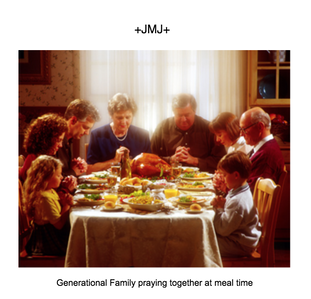
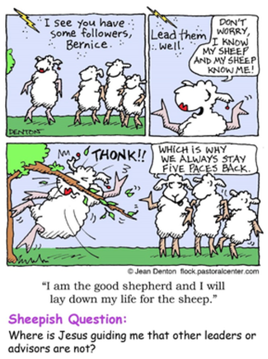

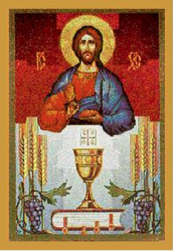

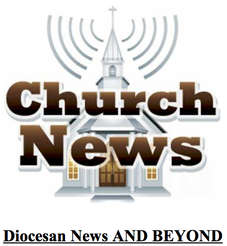





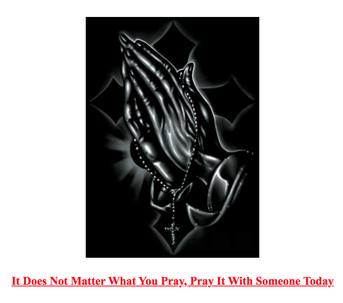
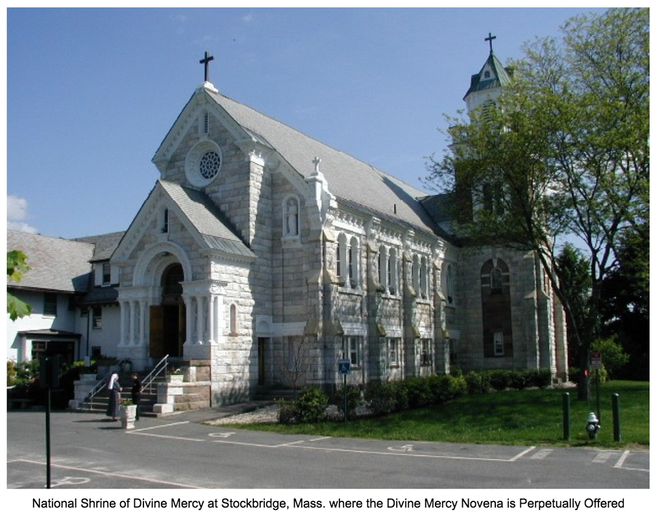
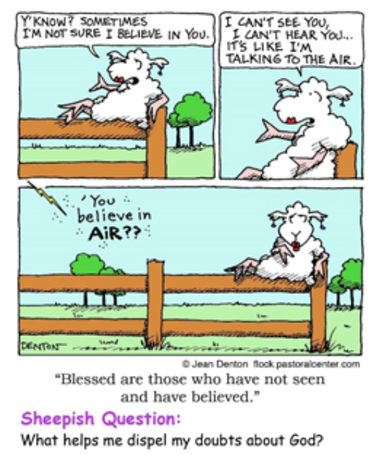
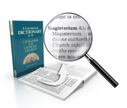
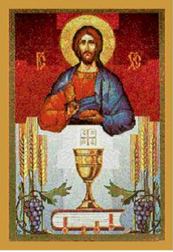
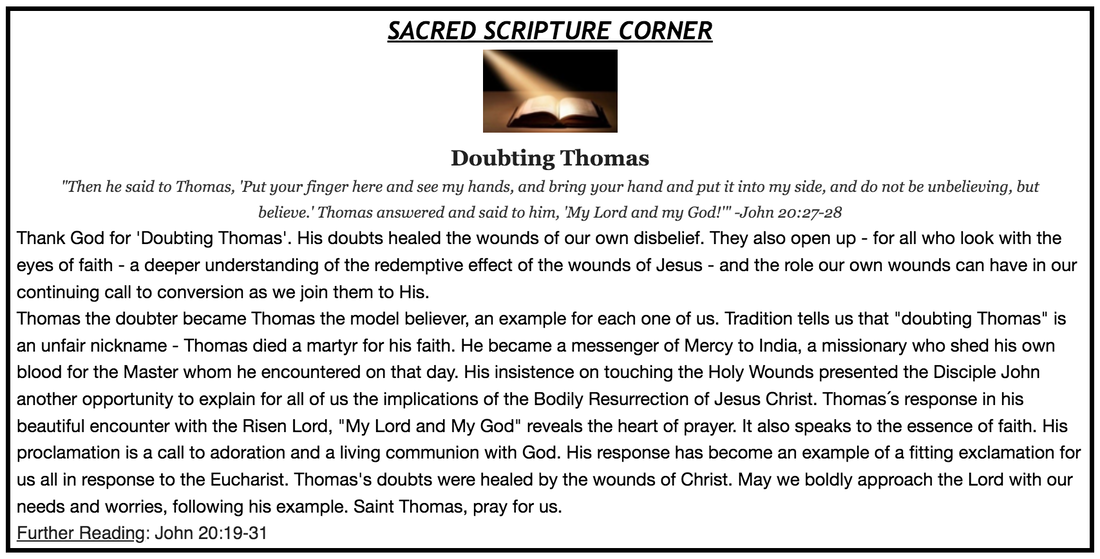

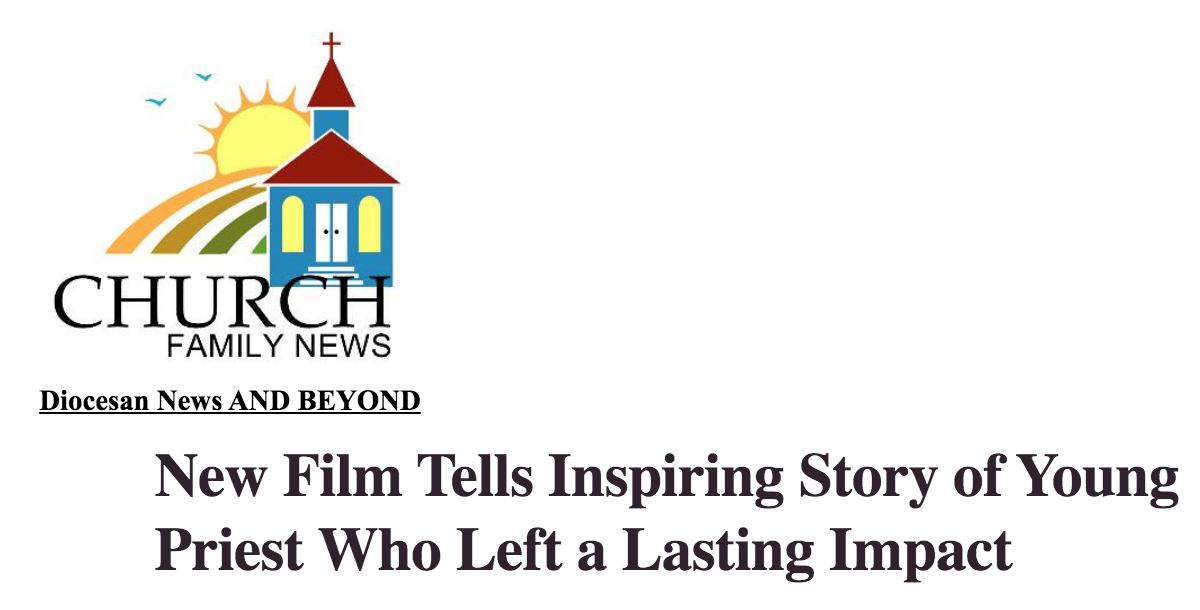
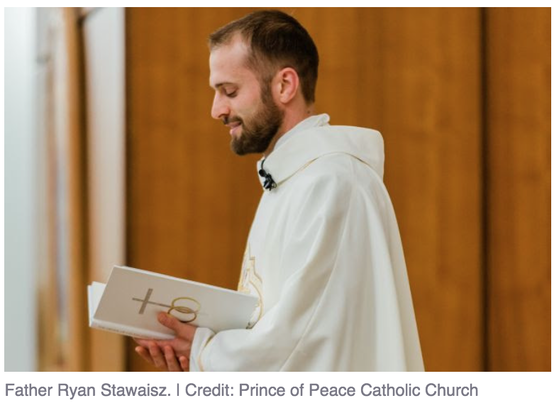
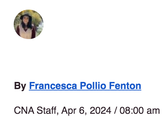
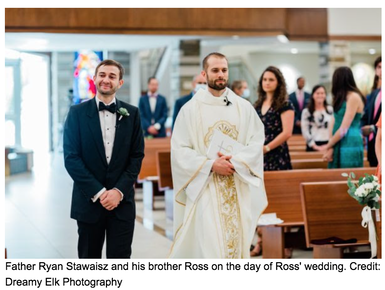
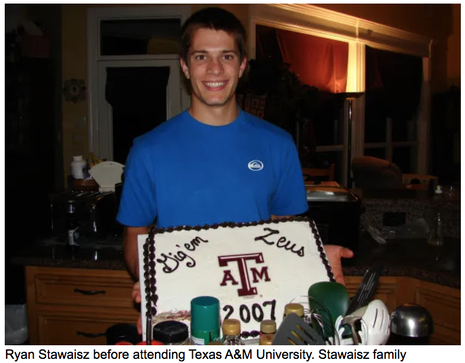
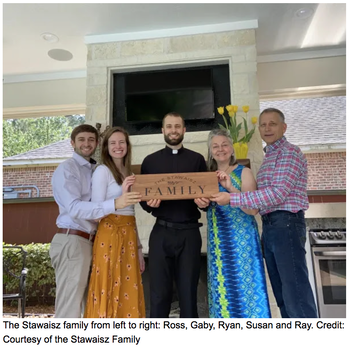
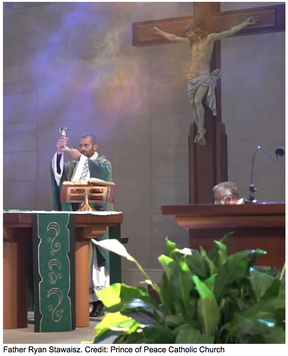
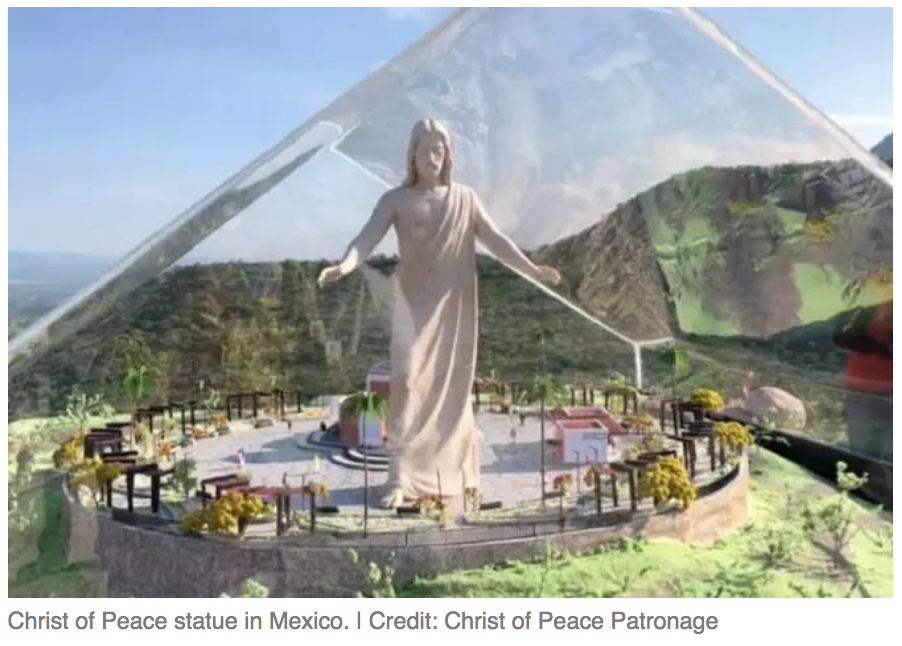
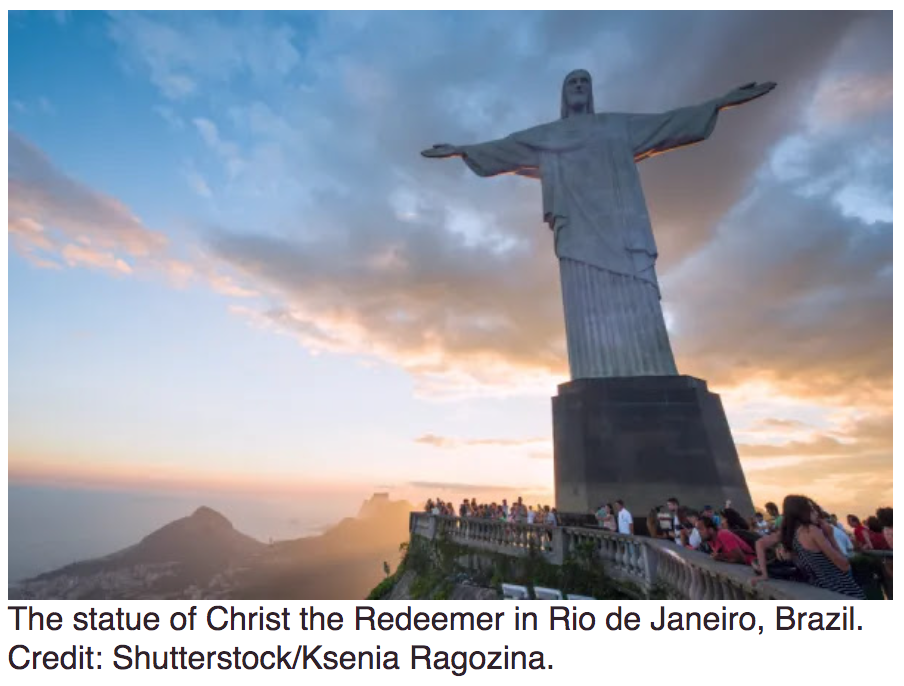
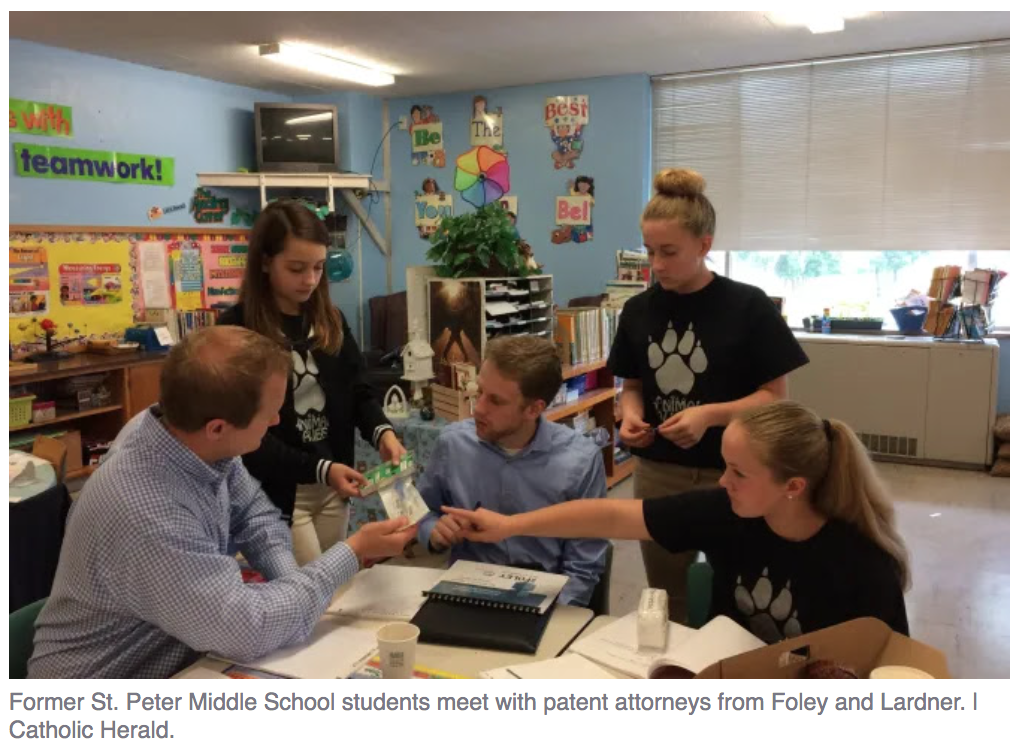
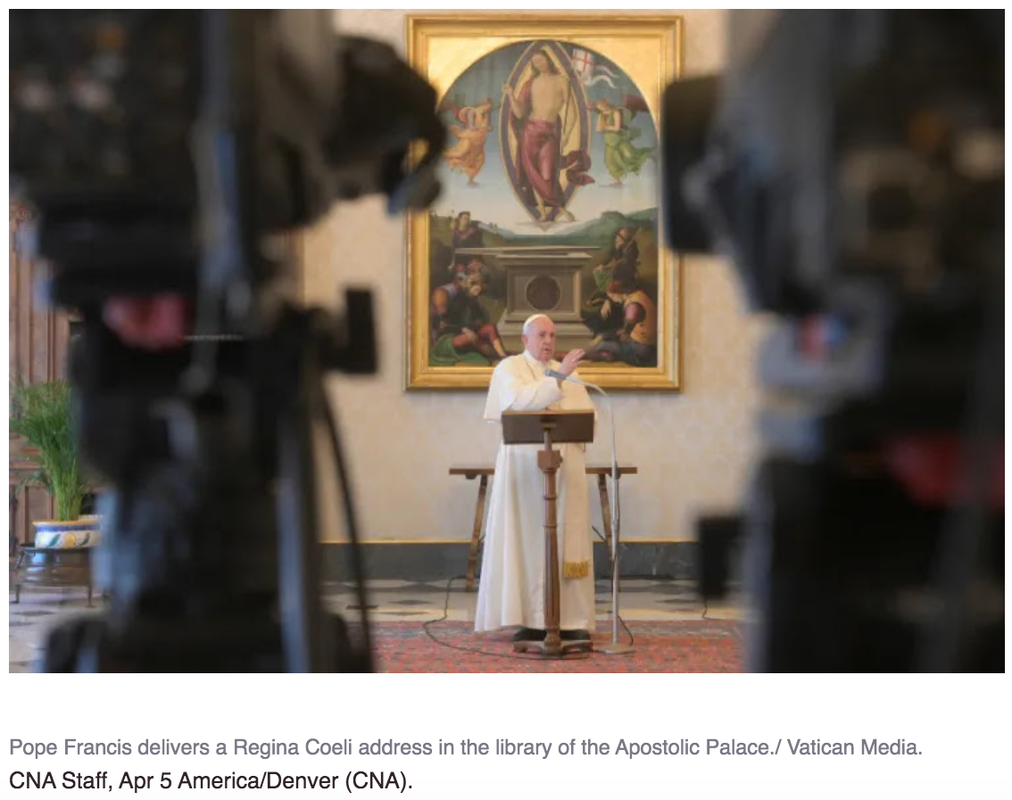

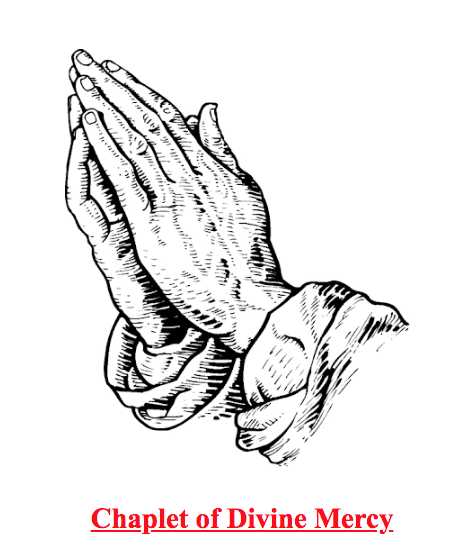
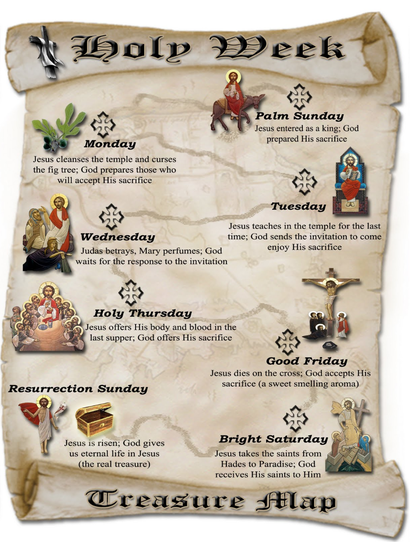
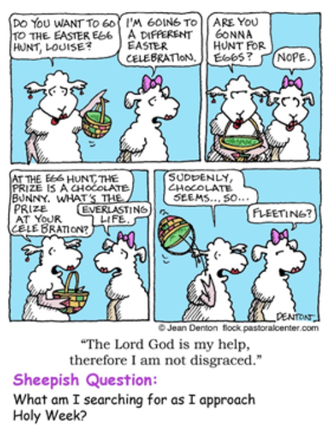


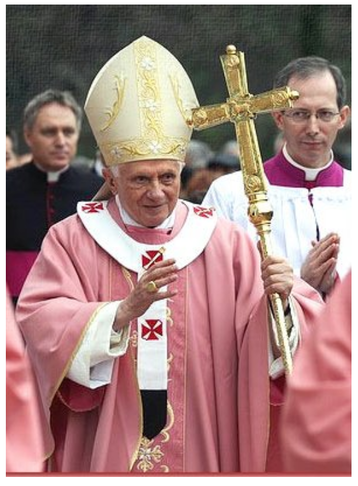
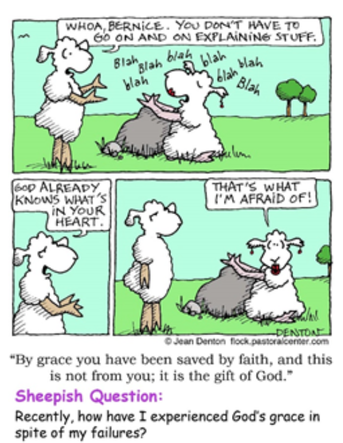

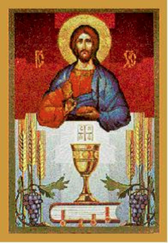

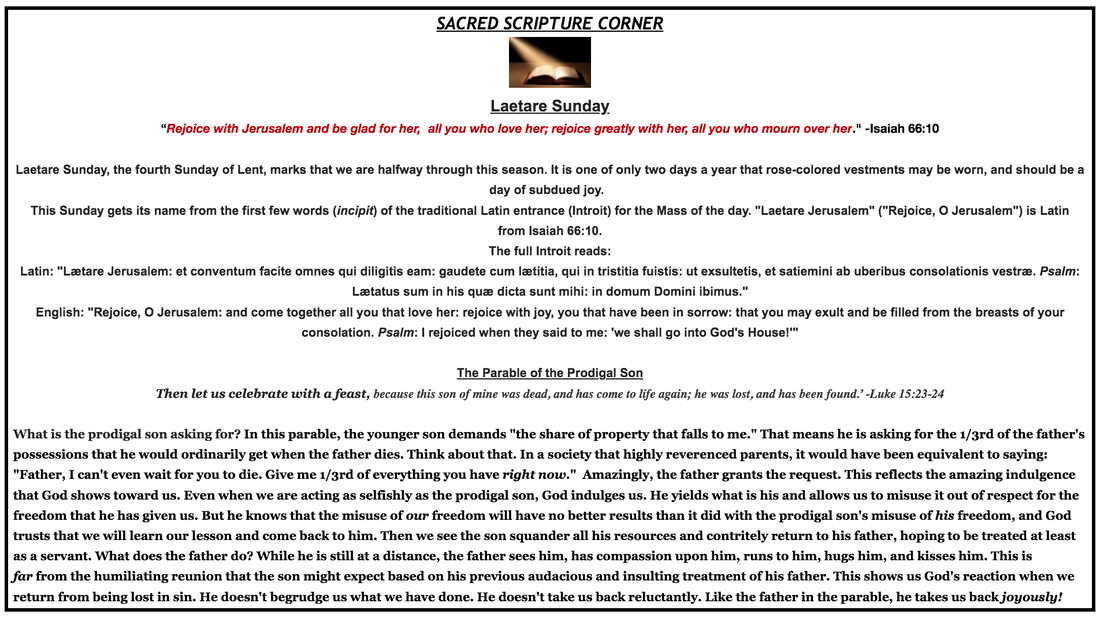


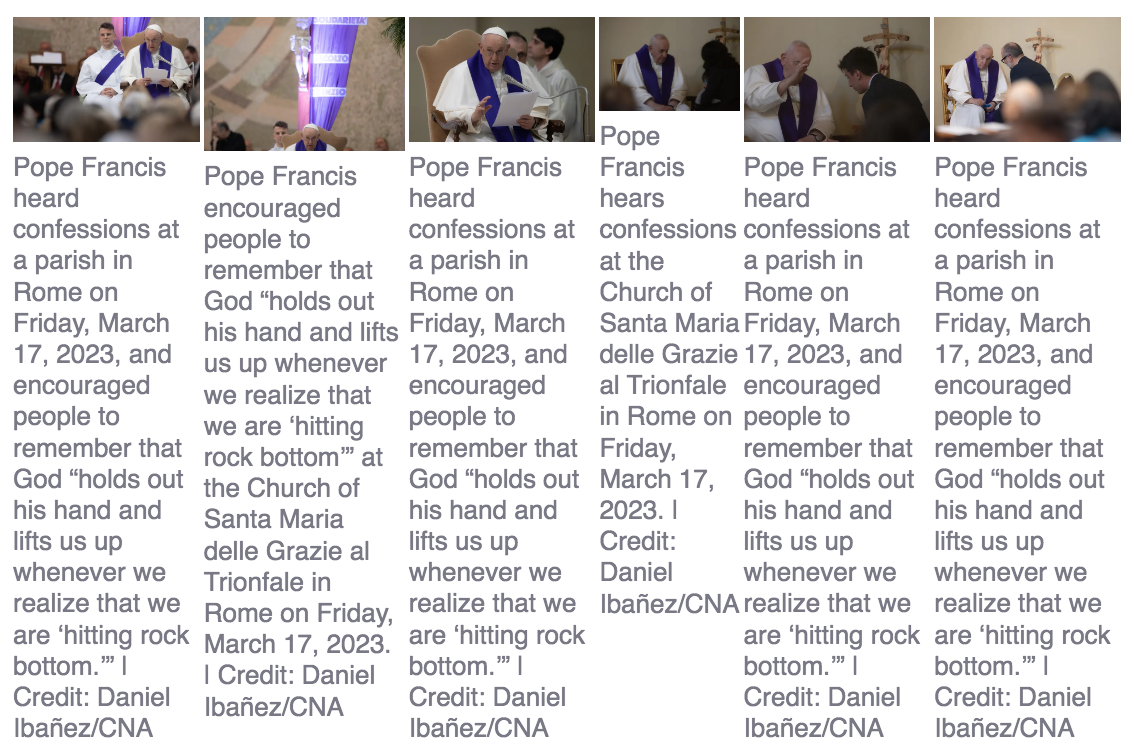

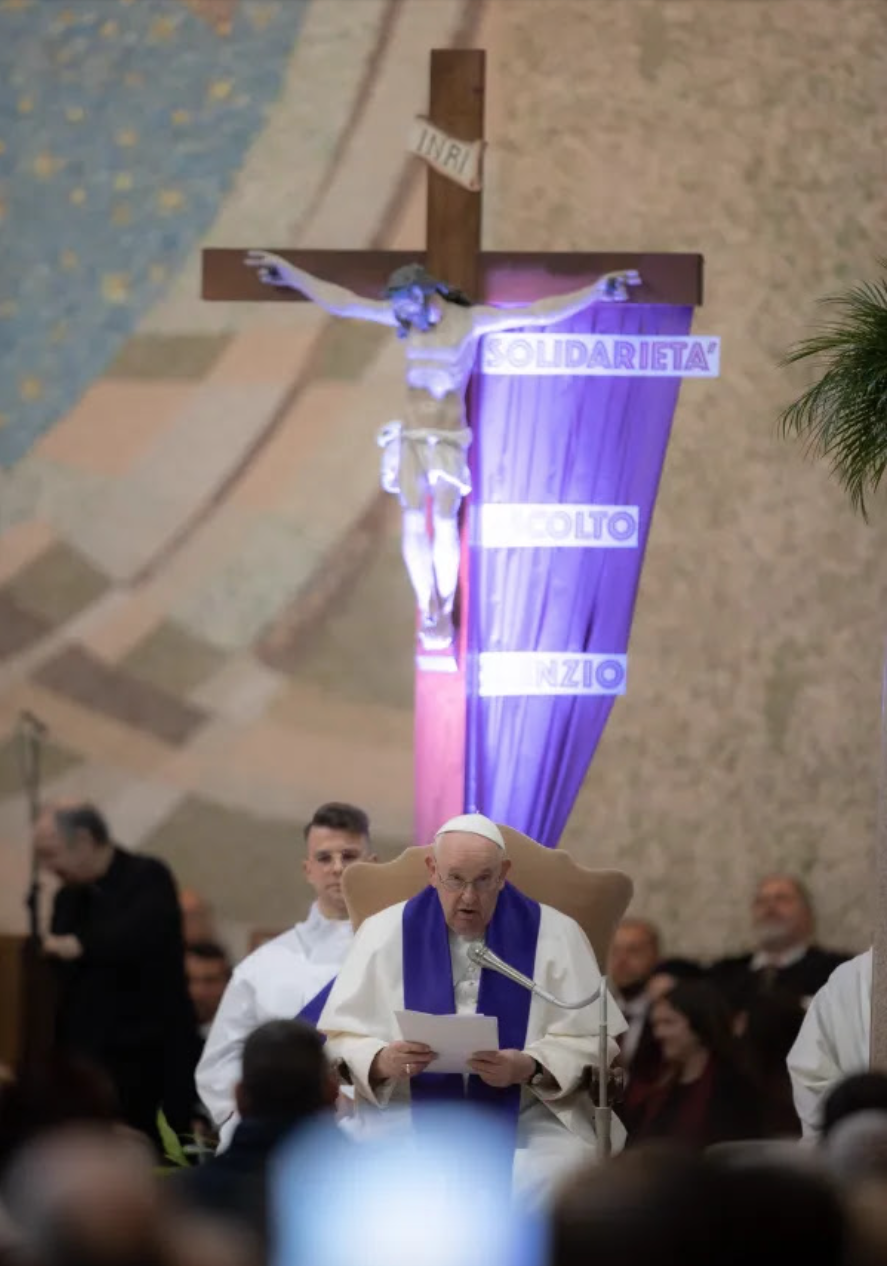
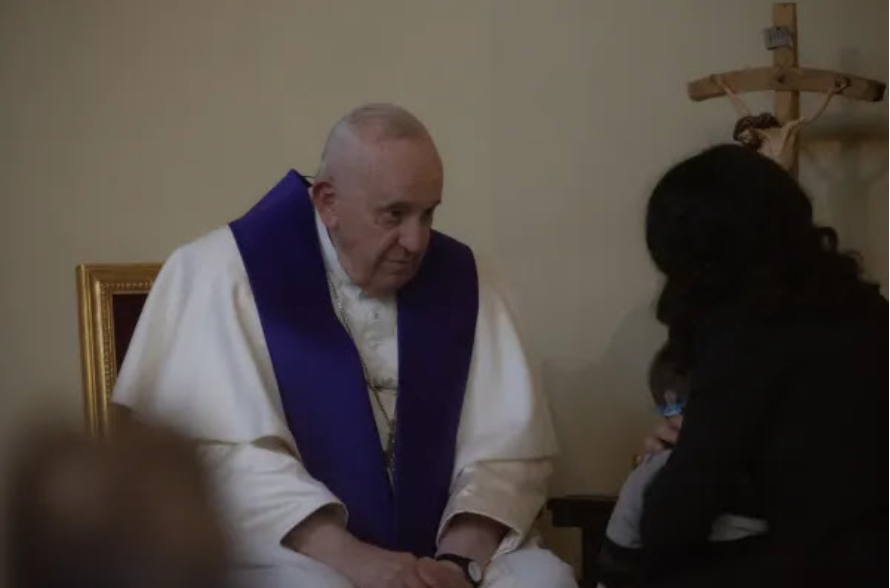

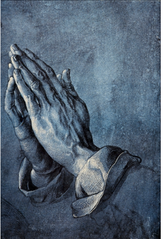
 RSS Feed
RSS Feed
